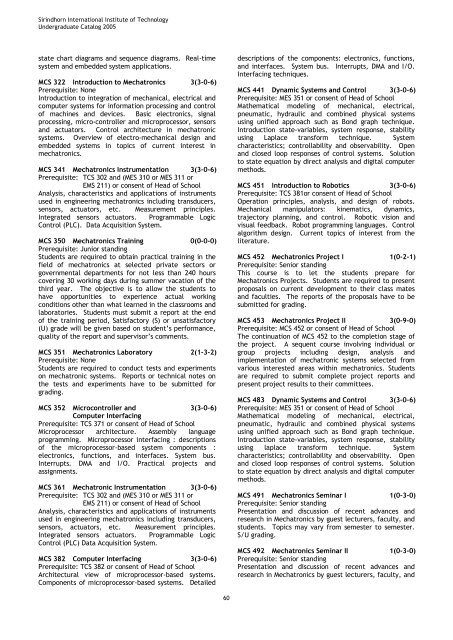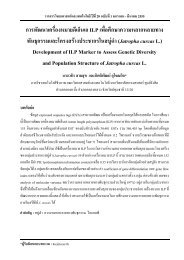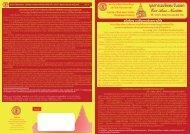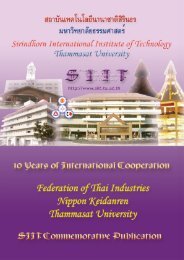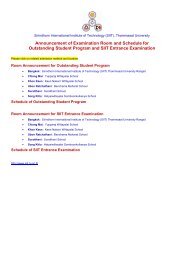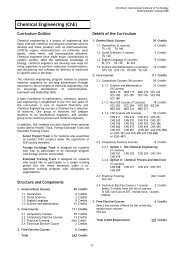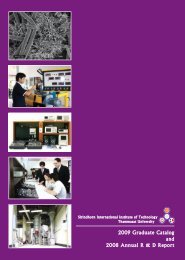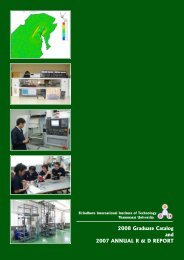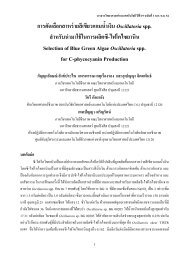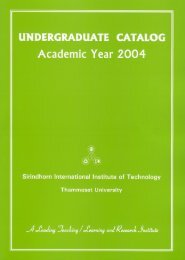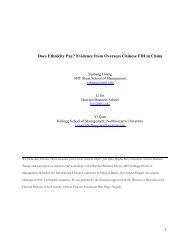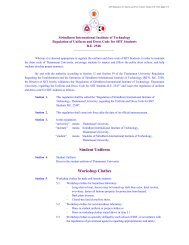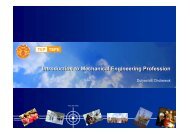Course Description - Sirindhorn International Institute of Technology
Course Description - Sirindhorn International Institute of Technology
Course Description - Sirindhorn International Institute of Technology
You also want an ePaper? Increase the reach of your titles
YUMPU automatically turns print PDFs into web optimized ePapers that Google loves.
<strong>Sirindhorn</strong> <strong>International</strong> <strong>Institute</strong> <strong>of</strong> <strong>Technology</strong><br />
Undergraduate Catalog 2005<br />
state chart diagrams and sequence diagrams. Real‐time<br />
system and embedded system applications.<br />
MCS 322 Introduction to Mechatronics 3(3‐0‐6)<br />
Prerequisite: None<br />
Introduction to integration <strong>of</strong> mechanical, electrical and<br />
computer systems for information processing and control<br />
<strong>of</strong> machines and devices. Basic electronics, signal<br />
processing, micro‐controller and microprocessor, sensors<br />
and actuators. Control architecture in mechatronic<br />
systems. Overview <strong>of</strong> electro‐mechanical design and<br />
embedded systems in topics <strong>of</strong> current interest in<br />
mechatronics.<br />
MCS 341 Mechatronics Instrumentation 3(3–0‐6)<br />
Prerequisite: TCS 302 and (MES 310 or MES 311 or<br />
EMS 211) or consent <strong>of</strong> Head <strong>of</strong> School<br />
Analysis, characteristics and applications <strong>of</strong> instruments<br />
used in engineering mechatronics including transducers,<br />
sensors, actuators, etc. Measurement principles.<br />
Integrated sensors actuators. Programmable Logic<br />
Control (PLC). Data Acquisition System.<br />
MCS 350 Mechatronics Training 0(0‐0‐0)<br />
Prerequisite: Junior standing<br />
Students are required to obtain practical training in the<br />
field <strong>of</strong> mechatronics at selected private sectors or<br />
governmental departments for not less than 240 hours<br />
covering 30 working days during summer vacation <strong>of</strong> the<br />
third year. The objective is to allow the students to<br />
have opportunities to experience actual working<br />
conditions other than what learned in the classrooms and<br />
laboratories. Students must submit a report at the end<br />
<strong>of</strong> the training period, Satisfactory (S) or unsatisfactory<br />
(U) grade will be given based on student’s performance,<br />
quality <strong>of</strong> the report and supervisor’s comments.<br />
MCS 351 Mechatronics Laboratory 2(1‐3‐2)<br />
Prerequisite: None<br />
Students are required to conduct tests and experiments<br />
on mechatronic systems. Reports or technical notes on<br />
the tests and experiments have to be submitted for<br />
grading.<br />
MCS 352 Microcontroller and 3(3–0–6)<br />
Computer Interfacing<br />
Prerequisite: TCS 371 or consent <strong>of</strong> Head <strong>of</strong> School<br />
Microprocessor architecture. Assembly language<br />
programming. Microprocessor interfacing : descriptions<br />
<strong>of</strong> the microprocessor‐based system components :<br />
electronics, functions, and interfaces. System bus.<br />
Interrupts. DMA and I/O. Practical projects and<br />
assignments.<br />
MCS 361 Mechatronic Instrumentation 3(3‐0‐6)<br />
Prerequisite: TCS 302 and (MES 310 or MES 311 or<br />
EMS 211) or consent <strong>of</strong> Head <strong>of</strong> School<br />
Analysis, characteristics and applications <strong>of</strong> instruments<br />
used in engineering mechatronics including transducers,<br />
sensors, actuators, etc. Measurement principles.<br />
Integrated sensors actuators. Programmable Logic<br />
Control (PLC) Data Acquisition System.<br />
MCS 382 Computer Interfacing 3(3‐0‐6)<br />
Prerequisite: TCS 382 or consent <strong>of</strong> Head <strong>of</strong> School<br />
Architectural view <strong>of</strong> microprocessor‐based systems.<br />
Components <strong>of</strong> microprocessor‐based systems. Detailed<br />
descriptions <strong>of</strong> the components: electronics, functions,<br />
and interfaces. System bus. Interrupts, DMA and I/O.<br />
Interfacing techniques.<br />
MCS 441 Dynamic Systems and Control 3(3‐0‐6)<br />
Prerequisite: MES 351 or consent <strong>of</strong> Head <strong>of</strong> School<br />
Mathematical modeling <strong>of</strong> mechanical, electrical,<br />
pneumatic, hydraulic and combined physical systems<br />
using unified approach such as Bond graph technique.<br />
Introduction state‐variables, system response, stability<br />
using Laplace transform technique. System<br />
characteristics; controllability and observability. Open<br />
and closed loop responses <strong>of</strong> control systems. Solution<br />
to state equation by direct analysis and digital computer<br />
methods.<br />
MCS 451 Introduction to Robotics 3(3–0‐6)<br />
Prerequisite: TCS 381or consent <strong>of</strong> Head <strong>of</strong> School<br />
Operation principles, analysis, and design <strong>of</strong> robots.<br />
Mechanical manipulators: kinematics, dynamics,<br />
trajectory planning, and control. Robotic vision and<br />
visual feedback. Robot programming languages. Control<br />
algorithm design. Current topics <strong>of</strong> interest from the<br />
literature.<br />
MCS 452 Mechatronics Project I 1(0‐2‐1)<br />
Prerequisite: Senior standing<br />
This course is to let the students prepare for<br />
Mechatronics Projects. Students are required to present<br />
proposals on current development to their class mates<br />
and faculties. The reports <strong>of</strong> the proposals have to be<br />
submitted for grading.<br />
MCS 453 Mechatronics Project II 3(0‐9‐0)<br />
Prerequisite: MCS 452 or consent <strong>of</strong> Head <strong>of</strong> School<br />
The continuation <strong>of</strong> MCS 452 to the completion stage <strong>of</strong><br />
the project. A sequent course involving individual or<br />
group projects including design, analysis and<br />
implementation <strong>of</strong> mechatronic systems selected from<br />
various interested areas within mechatronics. Students<br />
are required to submit complete project reports and<br />
present project results to their committees.<br />
MCS 483 Dynamic Systems and Control 3(3–0–6)<br />
Prerequisite: MES 351 or consent <strong>of</strong> Head <strong>of</strong> School<br />
Mathematical modeling <strong>of</strong> mechanical, electrical,<br />
pneumatic, hydraulic and combined physical systems<br />
using unified approach such as Bond graph technique.<br />
Introduction state‐variables, system response, stability<br />
using laplace transform technique. System<br />
characteristics; controllability and observability. Open<br />
and closed loop responses <strong>of</strong> control systems. Solution<br />
to state equation by direct analysis and digital computer<br />
methods.<br />
MCS 491 Mechatronics Seminar I 1(0‐3‐0)<br />
Prerequisite: Senior standing<br />
Presentation and discussion <strong>of</strong> recent advances and<br />
research in Mechatronics by guest lecturers, faculty, and<br />
students. Topics may vary from semester to semester.<br />
S/U grading.<br />
MCS 492 Mechatronics Seminar II 1(0‐3‐0)<br />
Prerequisite: Senior standing<br />
Presentation and discussion <strong>of</strong> recent advances and<br />
research in Mechatronics by guest lecturers, faculty, and<br />
60


